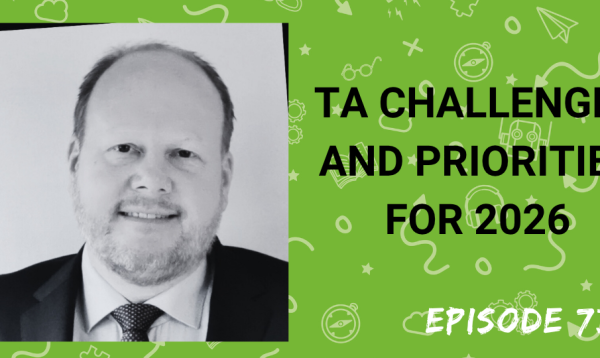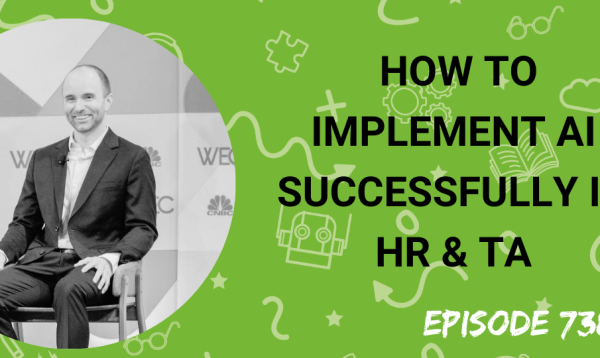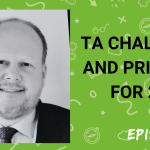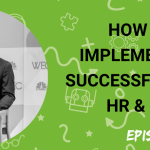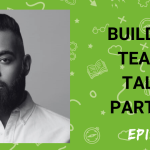We live in a highly connected world but also a very noisy one. Standing out from the crowd can be very difficult for recruiters, especially on Linkedin where an unprecedented amount of content is being posted, much of it, unfortunately, is not very good.
My guest this week is Hishem Azzouz, founder of Azzouz Branding and host of The Recruitment Rollercoaster Podcast. Hishem works with recruiters to help them build authentic personal brands and develop content that cuts through the noise to resonate with their target audiences.
In the interview, we discuss:
- Hishem’s career journey so far and his experience of getting started in recruiting
- Being more personable, more human and standing out from the crowd
- What does personal branding mean in 2019?
- Techniques to stand out and engage
- The importance of knowing your target audience
- What are the real measures of success?
Hishem also gives some examples of people and companies doing this well and shares more details about The Recruitment Rollercoaster Podcast.
Subscribe to this podcast in Apple Podcasts
Transcript:
Matt Alder [00:00:00]:
Support for this podcast comes from Zor. Zor is a global recruiting platform that drives smarter and more efficient hiring. Direct employers and staffing agencies use Zor’s AI powered software to automate recruiting’s most repetitive tasks like candidate pre screening, interview scheduling, ongoing engagement, and cold outreach at scale. By freeing recruiters to focus on what matters, Zor increases productivity while delivering a personalized, attentive candidate experience that’s responsive 24. 7 and delivers a 99.3% candidate satisfaction rate. Hundreds of companies across the globe, including IKEA, ExxonMobil, MOL Group, X5 Retail and Manpower Group, rely on Zor to hire better people faster. To find out more, go to www.ZOR.AI. that’s www.ZOR.AI AI and XOR is spelled X O R.
Matt Alder [00:01:22]:
Hi everyone, this is Matt Alder. Welcome to episode 226 of the Recruiting Future podcast. We live in a highly connected world, but also a very noisy one. Standing out from the crowd could be very difficult for recruiters, especially on LinkedIn where an unprecedented amount of content is being posted, much of which isn’t really very good. My guest this week is Hishem Azzouz, founder of Azzouz Personal Branding and host of the Recruitment Rollercoaster podcast. Heisham works with recruiters to help them build authentic personal brands and develop content that cuts through the noise to resonate with their target audiences. Enjoy the interview. Hi Hishem and welcome to the podcast.
Hishem Azzouz [00:02:12]:
Matt, thank you so much for giving me the opportunity to come on the podcast that inspired me to start mine.
Matt Alder [00:02:19]:
Fantastic stuff. Well, it’s an absolute pleasure to have you on the show. Could you just introduce yourself and tell everyone what you do?
Hishem Azzouz [00:02:27]:
Sure. So my name is Hishem Azzouz. I am the founder of a business called Azzouz Branding and that’s a really simple training and coaching business that my mission with it is is to help recruiters build their personal brands so they can reach more people that can help and impact more lives and make more money.
Matt Alder [00:02:50]:
Fantastic stuff. So tell us a little bit about your journey. How did you get to where you are today? And also tell us about your podcast.
Hishem Azzouz [00:02:57]:
Sure. So work agency recruitment for two and a half years. How I got sold recruitment was Hishem, I think you’ll be good at it. I asked them, why do you think I’ll be good at it? And they said, well, in the first year you have the chance to Earn six figures and you get to go to Ibiza and you could potentially get a Rolex. So I was sold, went into recruitment, joined a small business. I sat directly next to the owner of the business and everyone around me had been doing recruitment for four or five plus years and it was really tough my first year in recruitment, really difficult. Definitely one of the, the most challenging years of, of my career today. And going into my second year recruitment, having learned all the typical traditional routes of headhunting, of business development, cold calling, all the typical routes to make money and build my recruitment desk, I found myself sort of asking the question, well, what else can I do with LinkedIn? I hadn’t made a tremendous amounts of money out of LinkedIn on in my first year because how I got taught to use it was quite simple, which was post about your jobs online, send people impersonal messages, send people. Well, basically send as many messages as possible and you’ll get a result. And yeah, I decided to approach LinkedIn in a very different way in a market which no one was really doing anything on LinkedIn besides posting about jobs and these types of things, which was the big reason why I started. And I gave myself the one simple reason of the one simple rule, which was I’m not allowed to talk about jobs online. And that simple decision has just put me on a really interesting journey where I basically got really comfortable with sharing my opinion on LinkedIn, which led me to making the decision to start the podcast, which is called the Recruitment roller coaster. And it’s led me to where I am today, where I’m sort of helping recruiters and people in the recruitment industry sort of understand what I’ve been through in the journey that I’ve been through to help them understand how they can market themselves and be more personable and be human with this amazing tool, LinkedIn and stand out in the crowd, essentially.
Matt Alder [00:05:26]:
So we’ll come back and talk a bit more about the podcast later, but just sort of interested in drilling into, drilling into this in a little bit more depth. So effectively you’re offering personal branding strategy for recruiters. I mean, I think over the years we’ve seen lots of different definitions of personal branding and it’s kind of meant different things depending on the, depending on the time and the channels that are there. What’s your definition of it and how do you see it working for recruiters?
Hishem Azzouz [00:05:56]:
Totally. I think, I mean, honestly that question, you don’t need to overcomplicate the answer. I think for me it’s quite simple. It’s how people perceive you in the market that is in your market. It’s as simple as that. I think the definition online, it goes as something along the lines of its people marketing themselves, their careers as brands. So for me, it’s as simple as that. It’s what your clients and candidates or what potential people that would work for the business that you’re recruiting for would say about you when you’re not in the room. So why that’s beneficial for recruiters is that, I mean, if you can breed more trust and credibility online before you speak to someone, before you engage with someone, and people already have a feel or sense of who you are, what your perspectives are, what you stand for, and these types of things, then it can massively help you when you do start speaking to people for the first time, but they already feel like they know you, which is massively valuable and useful in a difficult market that has, doesn’t have the best reputation.
Matt Alder [00:07:15]:
So, I mean, that’s, that’s really interesting. Obviously, people are surrounded by lots of noise these days. LinkedIn’s very noisy, Instagram’s noisy, Facebook’s noisy. There’s. There’s just a huge amount of noise and distraction out there. What kind of strategies can recruiters use to, to, to really kind of make themselves stand out and engage with their target audiences?
Hishem Azzouz [00:07:39]:
Sure. So again, my whole thing here is you really don’t need to over complicate it. So this may sound simple, but you really don’t need to over complicate it. So the biggest challenge I get from recruiters when I work with them, before I start working with them, is he should have no idea what to talk about. Second one, I’m really worried that I’m going to come across a wally. I don’t want to come across. I’m uninformed. Who am I to talk about tech when I don’t write code, et cetera, et cetera. So typically where people should start, and if I was to go back and start again on sort of my content journey, what I’d really encourage everyone to do who’s listening before you decide to make those content, is really think about what you want to be known for within your market and actually really think about that. Write down what comes up. What do you stand for as a recruiter? Is it that you’re someone that always delivers interview feedback? Are you someone that really upholds transparency throughout the process, whatever it may be? Then the other thing you should think about on a personal level is what makes you you? What are your authentic characteristics and Also think about what you don’t want to be known for, how do you not want to be perceived? And when you really start thinking about those things, it can really help you build a bit of a picture as to what your message is. And the reason why I’d really encourage people to start there is because what that enables you to do, which is quite difficult early on, is really sort of understand what your message is. And for me, what I always say to recruiters who are worried about other people’s opinions and how people will perceive them in the market is, well, if we know that what’s really important to you and how you want to be perceived is being honest, is being transparent, is someone that does care, empathetic, et cetera, et cetera, then let’s really make sure that we focus on making sure that comes across through your words, through your videos, et cetera. Because at the end of the day, this whole personal brand piece, it’s not going to help someone that isn’t a good recruiter. That’s the great thing about this. If you’re a recruiter that isn’t honest, isn’t transparent, doesn’t care about giving candidates a good candidate experience when interviewing for your company, etc. But you’re trying to manufacture that online through LinkedIn or wherever. And then I engage with Matt, the internal recruiter that I thought was caring, empathetic, etc. And you’re not. And the experience is qu. Horrible and near the opposite of that. Very quickly you’re going to get found out. So this is the great thing with it, is that really think about what’s important to you, what you’re going to be known for, and really make sure you think about that when you start delivering content and focus on that early on, which helps you craft your message. I think that’s really important just because there’s a lot of recruiters out there that do look faceless online. And I think that’s the second point, really. Everyone that I work with, I ask them to send me over competitors, people that wake up every single morning that are trying to speak to the same people that you are. And that’s because I wanted to motivate people that there’s huge amounts of opportunity right now that a lot of your competitors, if that’s businesses that offer the same sort of culture, etc. Or if you’re in agency and it’s competitors that are trying to speak to the same candidates and businesses, a lot of them look the same online, although they work their socks off to to build a reputation in the one on one phone calls and meetings, etc. Does that make sense? I think that’s, that’s, that’s what I’m thinking.
Matt Alder [00:11:22]:
Yeah. I mean that, that makes perfect sense. And I think that in general I find that recruit recruiters aren’t necessarily particularly great at promoting themselves as individuals online and also maybe not so great at promoting themselves to their target audiences. I think lots of, lots of people, our industry are very good at promoting themselves to other people in the industry. But that’s, that’s kind of not really what it’ what it’s about.
Hishem Azzouz [00:11:47]:
Yeah, no, it’s a good point. So I think just to finalize that target audience, as I said, biggest challenge he should. Matt, I’m a recruiter. I have no idea what I should be creating content about. But Matt, my recruitment manager is telling me that it’s important. So I think basically what you should do, again, think about these questions. So if you’re an internal recruiter and you’re obviously hiring for the business that you work for, then what I’d really, really encourage you to think about what makes a perfect employee who you work with, what’s going on in their life right now, what are their biggest challenges, professionally and personally, what are their objectives. And a lot of these things being internal, you can actually access within your four walls, which I think is a huge advantage when I think of internal recruiters on delivering content, marking, marketing to their target audience is that you have access to the people that you want to be resonating with and engaging with within your four walls. Whereas obviously on the agency side and people that I work with, we have to rely on sort of the agency recruiter understanding the different nuances in the market and the different conversations that you pick up on in the meetings and the one on one focus, etc. That you know are challenges for the people that you work with, obviously recruit, etc. But I think as an internal recruiter, I’d really take a look around the office and, and speak to people and say, look, before you joined here, what were some of your biggest challenges? What were your biggest frustrations? What, what made you want to join here? What, what were your objectives that aligned with our business objectives, etc. And when you really understand that all of a sudden it becomes a lot easier to understand what you should be talking about because what you end up doing once you really map out your, the, your target audiences, professional challenges, personal challenges, their, their objectives, they’re the things that you should be talking about. Conversations around, on LinkedIn and online, which is going to drive engagement with the right people, drive conversations and get you better, enable you to better market yourself to the right people.
Matt Alder [00:14:00]:
This is going to be a difficult question to answer because I appreciate that it depends, depending on time and audience and context and all that kind of stuff. But you know, where we are right now, what tactics do you see sort of generally working very well. Is it video, is it audio, is.
Hishem Azzouz [00:14:22]:
It writing on LinkedIn?
Matt Alder [00:14:25]:
On LinkedIn or you know, indeed what, what, what kind of platforms are working? Is it, is it just LinkedIn or.
Hishem Azzouz [00:14:31]:
Well, I, I literally, I live and breathe on LinkedIn. I think obviously you, you obviously have to, you have to think about your target audience again. But I think if anyone listening, internal recruiter, agency recruiter, obviously you tell me that it’s predominantly internal recruiters. So I think let’s take a step back for a minute. Where, where do you predominantly find candidates that end up working for the business that you work for? Is it LinkedIn? I’d be pretty confident that that would be a quite solid percentage. So I will Talk specifically about LinkedIn. I think for me, I don’t think there’s any like clear tactic that is going to enable you to go from where you are right now if you’re not doing much to an overnight success. I think like anything, it is a process. But all I would say what I found that’s consistently worked well with my clients that I think definitely internal recruiters can use to their advantages is being human online through LinkedIn. And what I mean by that is simply actually allowing people to know the person that they’ve connected with. And I think that’s what we’re finding on LinkedIn right now. If you were to look, you’ve been in this world a lot longer than I have, Matt, so I think it’s safe to say that for example, Halloween’s just gone by. How many posts would you have seen on LinkedIn around Halloween and the office antics five or so years ago? Not sure. Really not sure. So I think what’s really working is enabling or using your online presence to actually have an opinion, be human, not be faceless. And I think internal recruiters can really utilize what’s within their four walls, the stories they have within their four walls, their own story, why they’re working for that business, etc, etc, that that can really help them stand out quite quickly and do really well.
Matt Alder [00:16:25]:
And have you got any examples? And it doesn’t matter whether it’s agency recruiters or in house recruiters or organization As a whole, have you got any examples of people who are doing this really well?
Hishem Azzouz [00:16:34]:
Sure, I think I’ve been. I’ve. I started my business four months ago. So I think the people that I’d really. People to look at the. I think are doing it quite well, to be fair. Actually, let me do people that I actually think are doing it well, that I haven’t worked with, that people can learn from and then also people that I see. So I think everyone’s seen Mark Gaisford. I think he’s. He’s very human on LinkedIn and he does loads with video. A chap that I used to actually live with who I think again has. Is really willing to be vulnerable, be personable, that I think again, has done really well and he’s really started his own recruitment business and that’s a chap called Tom Cotterill, he’s a UX recruiter. Then I think some of the businesses that I’ve worked with where it’s gone down quite well. There’s a tech recruitment business that I’ve worked with in London called Energon. People, they’ve all again, approached it in a really human and interactive way where they’ve got loads of people in the tech industry actually engaging with their content and then I think there’s a few other individuals, but I think that’s a. I think that’s a good core people that come to mind.
Matt Alder [00:17:52]:
What do you feel success looks like? Because I think sometimes there is a. A temptation just to look at, you know, what I call sort of vanity metrics. So, you know, number of likes, number of comments, all that kind of stuff. What, what is. What does real success look like as.
Hishem Azzouz [00:18:07]:
A recruiter, as an internal recruiter? It’s got a. It’s got to drive the right people to the means that you can then hire. As simple as that. If I’m thinking an internal recruiter, what success looks like is if I’m getting more relevant candidates coming to me or more relevant candidates engaged in my content, which then enables me to drive conversations around. Why are they open to opportunities? Let me tell you about the business that I work for, that I’m hiring for. So for me, that success, I think how that breaks down, obviously mentioned vanity metrics, how I measure it with my clients is you have awareness metrics, so that’s obviously the reach of your content. You then have engagements, as you said, likes and comments. I think all I would add. You mentioned vanity metrics. I think all I would add to that is, okay, so you are Getting loads of comments. But how many of those are relevant? Are they people that you could potentially speak about your business that you recruit for and work for? I think that’s a really important one to notice. If you’re getting really relevant people comment and like your post, then that’s a great thing. I think that’s more than vanity. It’s again, coming back to the. You’re talking about relevant things and it’s resonating with your target audience. Then the next one is inbound opportunities. I think if you’re doing it really well, then you will be getting inbound leads. So if that’s. As an agency recruiter, it’s clients saying, matt, how can you help me? I’ve seen your content. It’s candidates, Matt, how can you help me? I’m currently looking for a job. Likewise, internal recruiter. If it’s. It’s candidates for your business, then they should be coming to you and you can achieve that. And then I think the other really cool thing that I like that’s happened for a couple of my clients is, which is why I called it inbound Opportunities. Because you’re a person, because you’re an individual that can be perceived as someone that’s willing to share their opinion, then there’s a whole host of opportunities that could come from that. If that’s being invited on a podcast, if that’s being invited on a panel discussion, I think that’s a really cool thing as well. Because you’re an individual, there’s loads of opportunities that can come from it that will be commercially beneficial that you didn’t know could happen. If that makes sense, which I think is really important tonight.
Matt Alder [00:20:23]:
Absolutely. So finally, tell us more about your podcast. What. What’s the, you know, what’s the podcast about, who’s on it and where can people find it?
Hishem Azzouz [00:20:33]:
Sure. So in a nutshell, the podcast, it’s called the Recruitment Roller Coaster Podcast. And I’ve been doing it for nearly two years now. And my mission with it, or sort of why I started it, which has always remained the same, is to. To really uncover the. The true learnings, failures and successes of working in recruitment. Thinking of your audience, definitely in majority agency recruiters. However, I have had a number of internal recruiters on there as well. But ultimately you can. That’s what it’s all about. It’s actually uncovering the actual reality of working in an industry that is very. It can be very difficult and very unforgiving at times and actually talking about it in the right way. And as I said at the beginning of this podcast. Not just talking about the good parts where you can earn, potentially earn loads of money in these types of things, but actually talking about the reality of it and what people have learned along the way. You can listen to it in all the normal places. Apple, Podcast, Spotify, etc. It’s all in the places you expect it to be.
Matt Alder [00:21:45]:
Hishem, thank you very much for talking to me. My thanks to Hishem Azzouz. You can subscribe to this podcast in Apple Podcasts or via your podcasting app of choice. Please also follow the show on Instagram. You can find it by searching for recruiting Future. If you’re a Spotify or Pandora user, you can also find the show there. You can find all the past episodes@www.rfpodcast.com on that site. You can subscribe to the mailing list and find out more about Working with me. Thanks very much for listening. I’ll be back next week and I hope you’ll join me.


